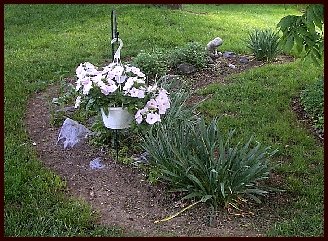 The
Silken Tent
The
Silken Tent
My Letter
to the World -- May, 1999
 The
Silken Tent
The
Silken Tent
My Letter
to the World -- May, 1999
This morning I typed a dozen or
so "New Member Profiles" for my church newsletter. We ask people who've
recently joined the congregation to tell us a little about themselves --
where they work, their kids' names and ages, their pets' names and species,
their interests. I think every woman I wrote about today listed "gardening"
as an interest.
 Back
on Palm Sunday I wrote about my garden ("Garden
Dreams"). In that piece I'd said that I would have a garden without
work. I would create as God creates, just by saying, "Here be the garden."
I think this is because a lot of gardening work falls in the same category
as floor care, my least favorite sort of house work. I was reluctant to
do hands and knees scrubbing, digging, and weeding when my body was more
lithe and supple. These days it's painful.
Back
on Palm Sunday I wrote about my garden ("Garden
Dreams"). In that piece I'd said that I would have a garden without
work. I would create as God creates, just by saying, "Here be the garden."
I think this is because a lot of gardening work falls in the same category
as floor care, my least favorite sort of house work. I was reluctant to
do hands and knees scrubbing, digging, and weeding when my body was more
lithe and supple. These days it's painful.
But I do have a garden, and dreams for
it. At left you see a picture taken this afternoon of my Moon Garden. It's
crescent-shaped, like the moon, and is planted all in white (or white-ish)
flowers. The idea is that at night the blooms will catch and reflect the
moon's
light, which is itself a reflection.
That's a pretty nifty concept for a poet like me who filters everything
through several layers of metaphor.
The plan of the garden comes from Theme Gardens, by Barbara Damrosch, a book which offers fifteen other plans, including a Zen garden, a Shakespeare garden, and a fragrance garden. Like many gardening books, the cover shows the author in clean blue jeans and and a crisp white shirt, leaning on a shovel beside a carefully arranged wheelbarrow and watering can.
I dug the garden ten years ago. OK, I didn't dig it, my husband did. And it's because of him that the crescent shape is so elegant and symmetrical. On a trip to Connecticut that summer I acquired the sculpture of the kneeling girl -- I liked the look, and the fact that she was named "Maggie." Later I added the Margaret and Anna tombstone fragment (the story can be found in "Cemetery Jones").
The garden looked nice for a while, but as with many plant installations, growth got ahead of maintenance. During the two years that I battled the soul-killing conditions at work that led to my retirement, I ignored the plot completely. The mums went leggy and crowded out the candytuft, the bulbs went to seed, and some opportunistic yarrow parked itself wherever it could find a spot.
In the fall I attended a week-long writing workshop led by gardening theologian Donna Schaper. Most of the other participants were, like me, women at a crossroads in life -- one was even keeping most of her unfinished dissertation materials in the trunk of her car, unable either to complete the project or abandon it. We talked about what gardening has to teach us about bloom and fade, about seasons fallow and fecund, about clearing out and beginning again.
Under Rev. Schaper's direction, we cleaned and rehabilitated a large plot at the retreat center that had been allowed to lose all semblance of what the original gardener had intended. My muscles ached after the unaccustomed exertion, but I recovered quickly.
The weekend after I came home I tackled the same tasks in my moon garden. I cut all the mums back to the ground, pulled out the offending yarrow, and worked Bulb-tone into the spots where I thought the daffodil and tulip clumps were. I washed the Maggie statue, reset Margaret and Anna, and placed outdoors for the first time two engraved stones my sister had given me. "Hope" and "Believe" they say.
So this spring, for the first time in many years, I enjoyed the bulb display in my moon garden. I've hung a basket of pinkish white wave petunias in one corner, and I'm keeping an eye on the shape that the hardy mum bushes are taking. My muscles ache after each foray into the garden, but the recovery time seems less each session.
I've tackled other long-neglected projects as well. Just last week I cleaned the trunk of my car, and I've begun my writing my mother's story because I think I can finally do it from a spirit of forgiveness and understanding rather than unresolved anger.
It seems my season of despair is truly over. I both hope and believe that sunny days are here to stay.
(Previous
-- Next)
This journal updates irregularly.
To learn when new pieces are added,
join
my Notify List.